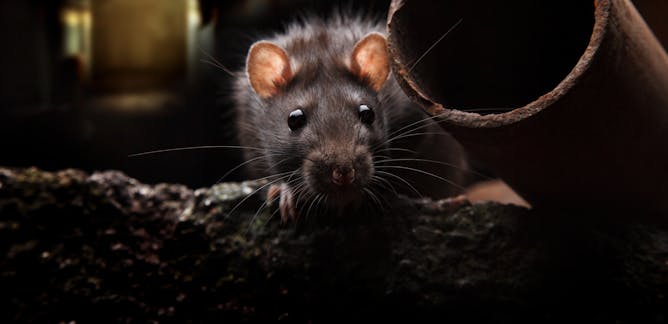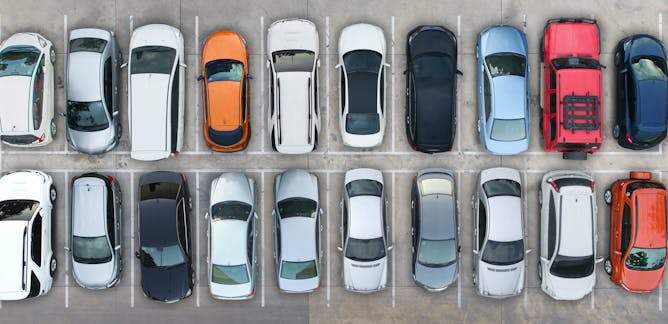|
It’s been such a great year here on the Science + Technology Desk at The Conversation Canada. We’ve reached hundreds of thousands of readers on topics as wide-ranging as archaeology, animal behaviour, urban planning, new technologies, quantum physics and a lot of outer space. Our work this year led us to be nominated for a 2019 People’s Choice Award for Canada’s Favourite Science Online Site.
One of the best parts of my job is that everyday I feel like I’m attending fascinating and exclusive seminars. All of the stories I work on are my favourites, but there are a few that I keep bringing up over and over again with my friends and family. They’re usually the fodder for interesting conversations about ethics, or along the lines of “Did you know…?” or “You’ll never believe this!”
I’m really fun at dinner parties.
Astrophysicist Toby Brown explored the mystery of missing galaxies in one of our most-read articles of the year. And in other cool jobs — although Earth-bound — rat detective Kaylee Byers wrote about how she tracked rats’ movements throughout the city.
A set of three provocative articles examined the emerging relationships between technology and sex, presenting new ethical perspectives. Neil McArthur and Markie Twist wrote about the developing new sexuality they term “digisexual.” Rachel Anne Bar, a neuroscientist at Université Laval, looked at the changes to the brain produced by high levels of pornography viewing. The University of British
Columbia’s Judy Illes and Farhad Udwalia explored the connections between sex robots and gender-based violence.
There were many archaeological findings this year that taught us more about changes to our planet and its residents. A 310-million-year-old fossilised forest in Nova Scotia contains a possible trove of yet-to-be-discovered animals, wrote Hillary Maddin. Geologists Joshua Davies and Margriet Lantink study rock strata to learn about the Earth’s orbit paths. Mirjanan Roksandic and Joshua Allan
Lindal explained what a Neanderthal tooth found in Serbia taught us about human migration.
Many important and urgent arguments about living in today’s technologically driven world were presented by our authors, including Siobhan O’Flynn’s call to protect the data privacy of our children. Jim Davies invited a charming consideration of how self-driving cars could improve the quality of urban life. And Fatemeh Torabi Asr wrote about her work on a tool that uses linguistic analysis to help us identify fake news.
I’m looking forward to 2020, and publishing stories that reveal more of our world — and beyond — to us. I hope you have a relaxing winter break and best wishes for 2020!
|
The Year in Science + Technology
|

Toby Brown, McMaster University
The first ever Canadian-led large project on one of the world's leading telescopes will investigate how the birth and death of galaxies are affected by their environment.
| |

Kaylee Byers, University of British Columbia
Genetic analysis shows that urban rats prefer to stay near their relatives; however, some of them migrate. Knowing this could help with pest control efforts.
|

Neil McArthur, University of Manitoba; Markie Twist, University of Wisconsin Colleges and the University of Wisconsin-Extension
Developments in technologies like robotics and virtual reality are opening new possibilities for sexual experiences.
| |

Rachel Anne Barr, Université Laval
Cognitive neuroscience finds that regular consumption of pornography affects the centres of the brain responsible for willpower, impulse control and morality.
|

Judy Illes, University of British Columbia; Farhad R. Udwadia, University of British Columbia
An increasing demand for sex robots is concerning, as there are ethical concerns about a possible related increase in gender-based violence.
| |

Hillary Maddin, Carleton University
Remains found in the Joggins Cliffs at the Bay of Fundy in Nova Scotia reveal further clues about ancient ecosystems.
|

Joshua Davies, Université du Québec à Montréal (UQAM); Margriet Lantink, Utrecht University
Layers of rock provide a historical record of variations in the Earth's orbit, revealing information about the planet's climate billions of years ago.
| |

Siobhan O'Flynn, University of Toronto
Google's history of privacy violations is especially alarming when considering the company's reach extends into educational products.
|

Jim Davies, Carleton University
An increase in the use of self-driving cars will change parking infrastructure in cities, and hopefully result in more colourful character neighbourhoods.
| |

Fatemeh Torabi Asr, Simon Fraser University
Using machine learning and natural language processing, researchers are developing an algorithm that can distinguish between real and fake news articles.
|
|
|